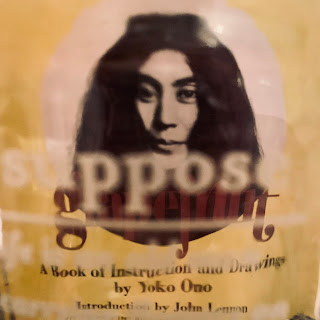Oxford-born travel writer and Kyoto then Nara, Japan transplant Pico Iyer was at Kepler's Books in Menlo Park, California tonight.
Two quotes stood out: 1) There are "72 seasons in Japan and religion in Japan is the seasons, a religion without dogma." 2) "California is about possibility, Japan is about reality."
Two quotes stood out: 1) There are "72 seasons in Japan and religion in Japan is the seasons, a religion without dogma." 2) "California is about possibility, Japan is about reality."
Iyer lit up when discussing his wife, clearly still in love after decades together. (In the book, he describes her voice as "made for singing" on the very first page.) Why did he settle down after so many years single? A seminal moment occurred when Hiroko explained he's impossible, so she just had to adapt to him. This non-Western philosophy of dating--accepting a person "as is" instead of forcing change--softened Iyer, causing him to adapt to his wife in turn. Out of this dance of reciprocity, and despite his limited Japanese and her average English, came relationship success, travels together, and a daughter. (I'm reminded of Pablo Neruda's lines in Love Sonnet 17: "I love you as one loves certain obscure things, secretly, between the shadow and the soul... I love you directly without problems or pride.")
Interestingly, before discussing his relationship with Hiroko, Iyer discussed playing ping pong at a community center, where everyone tries as hard as possible--but not to win. The idea is to challenge each other and oneself, to adapt to each other's styles, and to be joyful. It's difficult not to draw parallels between Iyer's description of dating and a ping pong match between two equals, playing as hard as they can, never wanting the game to end. If you are a fan of travel and/or Japan, you may enjoy one of Pico Iyer's books. I just bought The Lady and the Monk (1991) and hope to read it before his latest work.
Interestingly, before discussing his relationship with Hiroko, Iyer discussed playing ping pong at a community center, where everyone tries as hard as possible--but not to win. The idea is to challenge each other and oneself, to adapt to each other's styles, and to be joyful. It's difficult not to draw parallels between Iyer's description of dating and a ping pong match between two equals, playing as hard as they can, never wanting the game to end. If you are a fan of travel and/or Japan, you may enjoy one of Pico Iyer's books. I just bought The Lady and the Monk (1991) and hope to read it before his latest work.
© Matthew Rafat (2019)
Bonus I: many people outside of Japan are confused by the country. Japan is difficult to understand because outside perspectives differ based on whether one is discussing corporate Japan--an unforgiving, monolithic entity--or familial Japan--its patient, considerate side.
Familial Japan is like this quote from Yoshimoto Mahoko (aka Banana Yoshimoto): "Quality is always more important than quantity. This is true for everything. Even if you write only one line in your life, if it stays in someone’s mind forever, it is satisfactory."
Corporate Japan is the drunk group of men at the local bar, unnecessarily loud and rigidly opposed to substantive changes. (It's true the Toyota Production System (TPS) is renowned worldwide, but its changes typically modify existing processes, and employee promotions seem based on factors other than merit.)
Bonus II: an interview with Pico Iyer is HERE, but no transcript posted.













